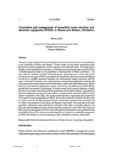Please use this identifier to cite or link to this item:
https://cris.library.msu.ac.zw//handle/11408/714| Title: | Generation and management of household waste electrical and electronic equipment (WEEE) in Harare and Mutare, Zimbabwe | Authors: | Jerie, Steven | Keywords: | Waste electrical and electronic waste, re-use, recycling, household | Issue Date: | 2014 | Publisher: | Midlands State University | Series/Report no.: | The Dyke;Vol. 8, No. 3; p. 1-16 | Abstract: | This paper analyses the generation and management of waste electrical electronic waste generated in the households of Harare and Mutare. Current studies in solid waste management have focused on the waste management practices of general municipal solid waste. This study seeks to amplify current knowledge by focussing on a relatively new and emerging type of waste-WEEE. A detailed analytical study is to be undertaken in the households in Harare and Mutare. The data collection methods involved 100 questionnaires administered per suburb that solicit information on the types of WEEE generated in the households, collection of waste and disposal as well as the residents awareness regarding the environmental impacts associated with the waste. A total of 12 interviews were undertaken(6 per city) with key stakeholders involved with waste issues such as Senior health environmental officers, heads of the health departments, officials from the Environmental Management Agency, local doctors, the Ministry of Health officials and the Non Governmental Organisations. A broader perspective of consumer behaviour revealed that there was a larger proportion of WEEE generated in Harare than in Mutare. Households in Harare contributed on average 63% while Mutare contributed 36% of the total WEEE in all the suburbs considered in this study. The study revealed that there is generally lack of awareness with regard to sound management of WEEE. Most of the households indicated that they were not aware of need for the disposal of small electric and electronic equipment items and hence did not think it was essential to worry about the disposal of such items. The actual fate of the small quantities of hazardous waste generated in municipal solid waste is generally unknown and hence the environmental persistence of these hazardous compounds is one of the critical issues in their long-term management and this is true with regard to the hazardous waste generated in the households of Gweru. The study recommends education of residents on sustainable management of WEEE that involves re-use and recycling as these contribute to resource conservation. | URI: | http://hdl.handle.net/11408/714 | ISSN: | 1815-9036 |
| Appears in Collections: | Research Papers |
Show full item record
Page view(s)
236
checked on Mar 4, 2026
Download(s)
64
checked on Mar 4, 2026
Google ScholarTM
Check
Items in MSUIR are protected by copyright, with all rights reserved, unless otherwise indicated.




